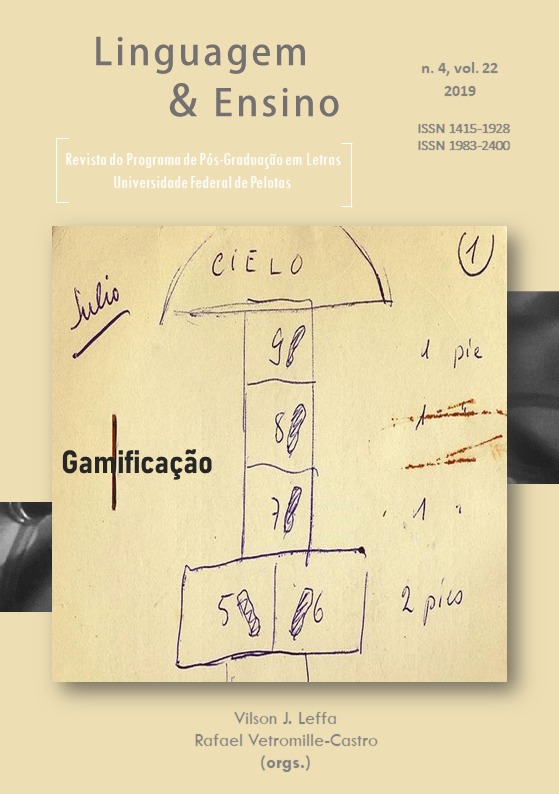Gamificação e aprendizagem de vocabulário em L2: a vocabox experience no programa Idiomas sem Fronteira
Palavras-chave:
Gamificação, Aprendizagem de vocabulário em L2, Vocabox experience, Idiomas sem fronteiras
Resumo
Este estudo investigou uma intervenção gamificada de ensino de vocabulário, chamada de Vocabox Experience, que foi implementada no contexto do programa Idiomas sem Fronteiras (IsF). A pesquisa foi desenvolvida de forma colaborativa entre os professores e coordenadores do IsF, com dados sendo coletados com 32 alunos pelos doze professores de inglês e um coordenador. Os dados foram coletados por meio de uma grade de observação durante as aulas e duas sessões de discussão focal, uma com os alunos e uma com os professores que implementaram os jogos em suas aulas. Os resultados qualitativos indicam que professores e alunos vêem a Vocabox Experience como uma oportunidade significativa de aprendizado, embora os professores tendam a ver o aprendizado como um aspecto mais amplo, enquanto os alunos tendem a vê-lo mais como a memorização de novas palavras. Os dados quantitativos mostram que os professores preferiram usar os jogos de vocabulário como warm up em suas aulas e equilibram os elementos de competição e colaboração ao planejar e executar os jogos. Quanto aos alunos, eles mostraram mais sinais de engajamento do que desengajamento, em geral.Downloads
Não há dados estatísticos.
Publicado
2019-12-23
Como Citar
Weissheimer, J., Geizy Marques de Souza, J., Pedro Lobo Antunes, J., & Silva de Souza Filho, N. (2019). Gamificação e aprendizagem de vocabulário em L2: a vocabox experience no programa Idiomas sem Fronteira. Revista Linguagem & Ensino, 22(4), 1136-1154. https://doi.org/10.15210/rle.v22i4.16453
Seção
Artigos
Autores que publicam nesta revista concordam com os seguintes termos: Autores mantêm os direitos autorais e concedem à revista o direito de primeira publicação, com o trabalho simultaneamente licenciado sob a Licença Creative Commons Attribution (BY-NC-ND 2.5 BR) que permite o compartilhamento do trabalho com reconhecimento da autoria e publicação inicial nesta revista. Autores têm autorização para assumir contratos adicionais separadamente, para distribuição não-exclusiva da versão do trabalho publicada nesta revista (ex.: publicar em repositório institucional ou como capítulo de livro), com reconhecimento de autoria e publicação inicial nesta revista. Autores têm permissão e são estimulados a publicar e distribuir seu trabalho online (ex.: em repositórios institucionais ou na sua página pessoal) a qualquer ponto antes ou durante o processo editorial, já que isso pode gerar alterações produtivas, bem como aumentar o impacto e a citação do trabalho publicado (Veja O Efeito do Acesso Livre).




1.png)
